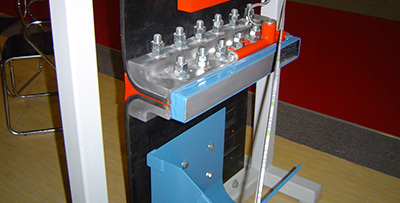News Center
Hezi technology focuses on the research and development of "rapid seamless conveyor belt joint sleeve" innovative technology project

NEWS CENTER

News Details
Discover the Top Benefits of Using Quality Conveyor Rubber Belt Fasteners
Release time:
2025-11-08
Top Benefits of Using Quality Conveyor Rubber Belt Fasteners In the fast-paced world of manufacturing and logistics, efficiency is key. One of the unsung heroes of this efficiency is the conveyor system, which relies heavily on rubber belts and their accompanying fasteners. Quality conveyor rubber belt fasteners play a pivotal role in ensuring smooth operations, reducing downtime, and maximizing p
Top Benefits of Using Quality Conveyor Rubber Belt Fasteners
In the fast-paced world of manufacturing and logistics, efficiency is key. One of the unsung heroes of this efficiency is the conveyor system, which relies heavily on rubber belts and their accompanying fasteners. Quality conveyor rubber belt fasteners play a pivotal role in ensuring smooth operations, reducing downtime, and maximizing productivity. In this article, we will explore the numerous benefits of using high-quality conveyor rubber belt fasteners and why they are vital for your business.
Understanding Conveyor Rubber Belt Fasteners
Before delving into the benefits, let's first understand what conveyor rubber belt fasteners are. These components are essential for securing the ends of conveyor belts, ensuring they remain intact during operation. Fasteners vary in design, material, and application, catering to different types of conveyor systems. The right choice of fastener can significantly impact the performance and longevity of the conveyor belt.
Types of Conveyor Rubber Belt Fasteners
Understanding the different types of conveyor rubber belt fasteners can help you select the best option for your needs:
Mechanical Fasteners
Mechanical fasteners, such as clips and clamps, are widely used in conveyor systems. They allow for easy installation and replacement, making them suitable for various applications.
Cemented Fasteners
Cemented fasteners involve bonding rubber materials to create a sturdy connection. These fasteners offer seamless integration and are ideal for heavy-duty applications.
Alligator and Rivet Fasteners
Alligator and rivet fasteners provide reliable and strong connections. They are particularly effective in industries where conveyor belts experience heavy loads.
1. Enhanced Durability
One of the primary benefits of using quality conveyor rubber belt fasteners is their enhanced durability. High-quality fasteners are made from robust materials designed to withstand the rigors of industrial environments. They resist wear and tear, ensuring that your conveyor system operates smoothly over extended periods.
Durable fasteners reduce the likelihood of failures, minimizing disruption and preventing costly downtime. Investing in quality fasteners means fewer replacements and repairs, translating into long-term savings for your organization.
2. Improved Operational Efficiency
Quality conveyor rubber belt fasteners contribute significantly to operational efficiency. They ensure that the conveyor belts remain securely attached, preventing slippage and misalignment. This stability is crucial for maintaining a consistent flow of materials along the conveyor system.
When fasteners are reliable, the risk of belt breakage diminishes. This not only keeps production running smoothly but also enhances safety by reducing the chances of accidents caused by malfunctioning equipment.
3. Cost-Effectiveness Over Time
While the initial investment in high-quality conveyor rubber belt fasteners may be higher than cheaper alternatives, the long-term cost-effectiveness is undeniable. Superior fasteners last longer, require less frequent replacements, and lead to fewer service interruptions.
Reduced maintenance costs and lower downtime contribute to the overall savings associated with quality fasteners. Businesses that prioritize investing in durable components often experience greater profitability due to increased operational reliability.
4. Versatility for Various Applications
Quality conveyor rubber belt fasteners are versatile and can be used across a wide range of industries. From food processing to mining and manufacturing, these fasteners can accommodate different belt types and sizes, ensuring compatibility with your existing systems.
Whether you're handling lightweight materials or heavy loads, quality fasteners offer the adaptability needed for various applications. This versatility simplifies inventory management and reduces the hassle of sourcing multiple fastener types.
5. Reduced Maintenance and Downtime
Frequent maintenance can detract from productivity and increase operational costs. Quality conveyor rubber belt fasteners reduce the need for regular maintenance by providing a stable and reliable connection. Their durability ensures that issues related to fastener failure are minimized, allowing your team to focus on core operations.
Less downtime translates to higher overall productivity. When your conveyor system operates without frequent disruptions, your business can achieve its targets more efficiently.
6. Enhanced Safety Standards
Safety is a paramount concern in any industrial setting. Quality conveyor rubber belt fasteners contribute to enhanced safety standards by minimizing the risk of equipment failure and accidents. When belts are securely fastened, the likelihood of unexpected breakdowns decreases, protecting both employees and equipment.
Investing in quality fasteners also demonstrates a commitment to workplace safety, which can enhance employee morale and reduce liability risks for your organization.
7. Environmental Considerations
Quality conveyor rubber belt fasteners can also have positive environmental implications. Durable fasteners contribute to a reduction in waste by decreasing the frequency of replacements. By using high-quality materials that last longer, you can minimize the environmental impact associated with manufacturing and disposing of fasteners.
Furthermore, efficient conveyor systems with reliable fasteners operate more effectively, resulting in lower energy consumption and a reduced carbon footprint over time.
8. Expert Installation and Support
When investing in quality conveyor rubber belt fasteners, it is essential to consider the support and expertise available from suppliers. Many reputable manufacturers offer guidance on selecting the right fasteners for your needs and provide installation services.
Having access to expert advice ensures that you make informed decisions, optimizing the performance of your conveyor system. This support can be invaluable, especially in complex applications where specific requirements must be met.
Conclusion
In conclusion, the advantages of using quality conveyor rubber belt fasteners are clear. From enhanced durability and operational efficiency to reduced maintenance costs and improved safety, these fasteners play a crucial role in the performance of conveyor systems across various industries. By investing in high-quality fasteners, businesses can ensure the longevity of their equipment, enhance productivity, and ultimately drive profitability.
For those looking to optimize their conveyor systems, prioritizing quality fasteners is a strategic decision that will yield significant returns. As we have explored, the benefits extend beyond mere functionality, contributing to a safer, more efficient, and environmentally responsible operation. Explore your options today and make the choice that will propel your business forward.
FAQs
1. What materials are used in quality conveyor rubber belt fasteners?
Quality conveyor rubber belt fasteners are typically made from durable materials such as steel, plastic, or rubber compounds designed to withstand harsh industrial environments.
2. How can I determine the right fastener for my conveyor system?
To determine the right fastener, consider factors such as the type of conveyor belt, the materials being transported, and the environmental conditions. Consulting with a supplier can provide valuable insights.
3. Are mechanical fasteners better than cemented fasteners?
It depends on the application. Mechanical fasteners offer ease of installation and replacement, while cemented fasteners provide a seamless connection ideal for heavy-duty use.
4. How often should I replace conveyor rubber belt fasteners?
The lifespan of fasteners varies based on usage and environmental conditions. Regular inspections can help identify when replacements are necessary before they fail.
5. Can quality fasteners improve conveyor system safety?
Yes, quality fasteners enhance safety by reducing the risk of equipment failure and accidents, as they ensure that belts remain securely fastened during operation.
Previous Page
Previous Page

Recommend News





























